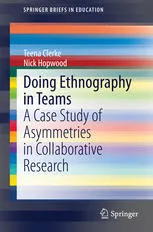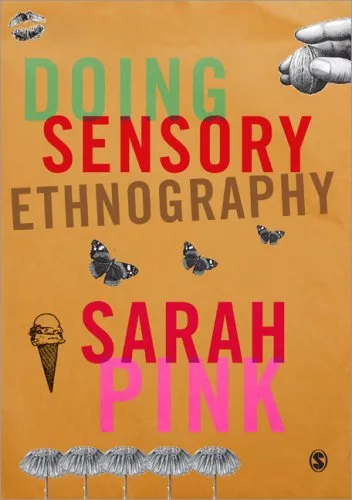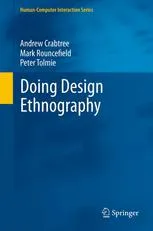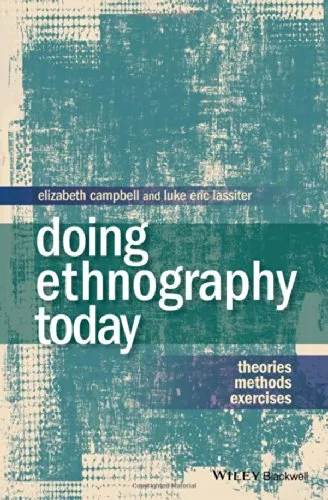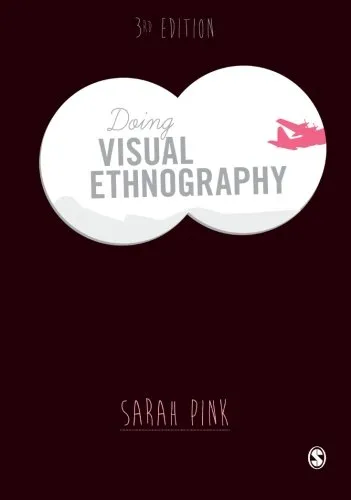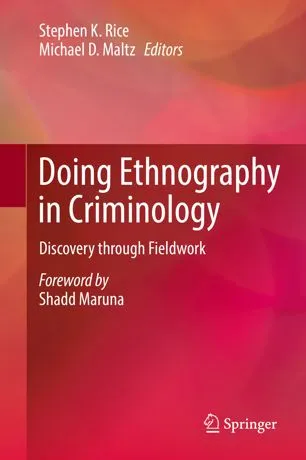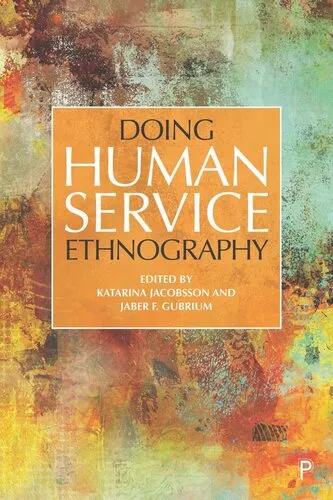Doing Ethnography in Teams: A Case Study of Asymmetries in Collaborative Research
4.0
بر اساس نظر کاربران

شما میتونید سوالاتتون در باره کتاب رو از هوش مصنوعیش بعد از ورود بپرسید
هر دانلود یا پرسش از هوش مصنوعی 2 امتیاز لازم دارد، برای بدست آوردن امتیاز رایگان، به صفحه ی راهنمای امتیازات سر بزنید و یک سری کار ارزشمند انجام بدینکتاب های مرتبط:
معرفی کتاب "Doing Ethnography in Teams: A Case Study of Asymmetries in Collaborative Research"
کتاب "Doing Ethnography in Teams: A Case Study of Asymmetries in Collaborative Research" اثری خاص و منحصربهفرد از نویسندگان Teena Clerke و Nick Hopwood است که به بررسی عمیق کار میدانی در Ethnography بهصورت تیمی میپردازد. این کتاب، که در راستای واکاوی تفاوتها و نامتقارنیهای موجود در تحقیقات گروهی نوشته شده است، راهنمای جامعی برای محققانی است که درگیر فعالیتهای تحقیقاتی مشارکتی هستند. در ادامه، این کتاب نکات کلیدیای دربارهی دینامیکهای گروهی، قدرت، وابستگیها و چالشهای همکاری در تیمهای تحقیقاتی ارائه میدهد.
خلاصهای از کتاب
این کتاب به طور خاص بر روی موضوع نامتقارنیها یا asymmetries در تحقیقات تیمی تمرکز دارد و این مسئله را واکاوی میکند که چطور قدرت، نقشها و دانش متفاوت اعضای تیم میتواند بر نتایج تحقیقات تاثیر بگذارد. نویسندگان از طریق مطالعهای موردی (case study) دقیق و موشکافانه به بررسی روش انجام Ethnography توسط تیمهای تحقیقاتی پرداختهاند. در این اثر، نکات مهمی از جمله کیفیت تعاملات در تیم، مسئولیتها، روشهای کارآمد همکاری و نحوهی مدیریت تعارضها مطرح شده است. علاوه بر این، کتاب بر اهمیت انعطافپذیری، قابلیت گوش دادن فعال و توجه به بافت اجتماعی-فرهنگی در فرآیند Collaborative Research تاکید دارد.
نکات کلیدی کتاب
- بررسی دقیق مفهوم نامتقارنیها (asymmetries) در تیمهای تحقیقاتی.
- تشریح تاثیرات قدرت و پویاییهای قدرت بر عملکرد تیمها.
- روشهای کاربردی برای ایجاد همکاری موثر بین اعضای تیمهای چندرشتهای.
- تشویق به بازاندیشی (Reflexivity) و تحلیل نقادانه در طول تحقیقات.
- تمرکز بر اهمیت گوش دادن متقابل، مدیریت تعارض و شفافسازی نقشها در تیم.
نقلقولهایی از کتاب
"The power dynamics in collaborative research are often invisible yet profoundly impactful." این جمله یکی از پیامهای کلیدی کتاب است که نشان میدهد چگونه قدرت، گاهی به صورت پنهان، فرآیندهای تحقیقاتی را شکل میدهد.
"Collaboration is not devoid of conflict; it is the art of managing these conflicts constructively." نویسندگان در اینجا تلاش کردهاند تا همکاری تیمی را به عنوان فرآیندی پویا و همراه با چالشهای طبیعی توصیف کنند.
چرا کتاب "Doing Ethnography in Teams" مهم است؟
این اثر برای هر کسی که به تحقیق در قالب تیمی علاقهمند است، منبعی ارزشمند و ضروری به شمار میآید. علاقهمندان به رشتههای مختلف از قبیل مطالعات اجتماعی، انسانشناسی، آموزش و دیگر زمینههای مرتبط میتوانند از این کتاب برای تقویت توانمندیهای همکاری و تحلیل انتقادی خود استفاده کنند. نویسندگان به وضوح دریافتهاند که کار تیمی چالشبرانگیز است، اما در عین حال، با درک درست از نقشها، قدرت و دینامیکها میتوان به موفقیتهای بزرگتری رسید.
این کتاب، خوانندگان را تشویق میکند که به تعاملات تیمی از زاویهدیدی جدید نگاه کنند و از فرصتهایی که تفاوتها و نامتقارنیها ارائه میدهند، بهرهبرداری کنند. از این رو، این اثر نه تنها نظریهپردازی، بلکه منبعی کاربردی و عملی برای پیشبرد پروژههای تحقیقاتی گروهی محسوب میشود.
Introduction
"Doing Ethnography in Teams: A Case Study of Asymmetries in Collaborative Research" is an insightful exploration of what it means to undertake ethnographic work collaboratively. Authored by Teena Clerke and Nick Hopwood, this book delves into the intricacies of teamwork in ethnographic inquiry, a realm that remains underexplored despite its increasing relevance across academic, professional, and interdisciplinary research fields. Through a carefully framed case study, the authors highlight the challenges, asymmetries, and opportunities that arise when carrying out collaborative ethnography.
Ethnography, traditionally a solo endeavor, is evolving into a collaborative practice to embrace diverse perspectives and address complex questions. This transformation, however, brings unique difficulties, such as power imbalances, the clash of viewpoints, and individual versus team roles in research. The book serves as both a theoretical base and practical guide, making it an essential resource for anyone engaged in or aspiring to collaborative ethnographic studies.
Detailed Summary of the Book
The core of the book revolves around a rich case study that underpins the authors' exploration of the dynamics inherent in working ethnographically within teams. Clerke and Hopwood use this case study to expose the subtle and overt asymmetries found in collaborative research projects, particularly in terms of power, knowledge production, and voice.
The book moves through various key stages of ethnographic research—including planning, data collection, analysis, and dissemination—with a critical lens on how teamwork shifts perceived norms of ethnographic practice. It underscores the nuanced negotiations, conflicts, and resolutions inherent in team-based research while addressing questions such as: Who drives the research agenda in a team? How are differences in expertise or perspectives reconciled? Who ultimately owns the narrative that emerges?
A significant contribution of the book lies in its ability to intertwine the theoretical underpinnings of collaborative ethnography with hands-on examples and practical guidance. By doing so, the authors make it an accessible and intellectually engaging text both for beginners exploring ethnography and seasoned researchers interested in team dynamics. Furthermore, the book sheds light on broader concerns such as academic labor, authorship, and the division of roles within collaborative frameworks.
Key Takeaways
- Ethnography as a collective endeavor offers new insights but comes with unique challenges such as differing motivations, power asymmetries, and conflicts.
- Team dynamics shape every phase of the research process, from conceptualization to publishing, creating a complex web of accountability and collaboration.
- Asymmetries in collaborative research are not inherently negative but require thoughtful management and reflection to ensure ethical and productive teamwork.
- The book combines theory and practice, offering relatable real-world examples that highlight how concepts play out in collaborative ethnographic research.
- Power dynamics, unlike traditional solo research, are relational, context-dependent, and dynamic in team-based ethnography.
Famous Quotes from the Book
"Collaboration is not the simple merging of voices, but a process of negotiation, compromise, and sometimes tension that shapes what emerges."
"Asymmetry in ethnographic teams is neither to be avoided nor celebrated; it is to be confronted and understood as fundamental to collaborative practice."
"The challenge of team ethnography lies not in suppressing differences, but in harnessing them as sources of richness."
Why This Book Matters
"Doing Ethnography in Teams" is a pivotal read for anyone involved in qualitative research or ethnography, particularly in an academic or professional context where collaboration is increasingly emphasized. In a world where interdisciplinary approaches are becoming the norm, understanding how to work effectively in research teams is essential—and this book offers invaluable insights into navigating such terrain.
By addressing both theoretical and practical dimensions of team-based research, Clerke and Hopwood provide a resource that bridges the gap between abstract concepts and ground-level realities. The book’s relevance extends beyond just ethnography; its lessons on teamwork, power dynamics, and the social construction of knowledge apply broadly to many collaborative settings.
This book matters because it encourages researchers to critically reflect on their practices and consider how collaboration transforms not only their projects but also their relationships, roles, and responsibilities. It challenges researchers to embrace the complexity of teamwork while using it as a tool for deeper, more inclusive inquiry.
دانلود رایگان مستقیم
شما میتونید سوالاتتون در باره کتاب رو از هوش مصنوعیش بعد از ورود بپرسید
دسترسی به کتابها از طریق پلتفرمهای قانونی و کتابخانههای عمومی نه تنها از حقوق نویسندگان و ناشران حمایت میکند، بلکه به پایداری فرهنگ کتابخوانی نیز کمک میرساند. پیش از دانلود، لحظهای به بررسی این گزینهها فکر کنید.
این کتاب رو در پلتفرم های دیگه ببینید
WorldCat به شما کمک میکنه تا کتاب ها رو در کتابخانه های سراسر دنیا پیدا کنید
امتیازها، نظرات تخصصی و صحبت ها درباره کتاب را در Goodreads ببینید
کتابهای کمیاب یا دست دوم را در AbeBooks پیدا کنید و بخرید
1334
بازدید4.0
امتیاز0
نظر98%
رضایتنظرات:
4.0
بر اساس 0 نظر کاربران
Questions & Answers
Ask questions about this book or help others by answering
No questions yet. Be the first to ask!
